 Petzlover
Petzlover Anatolian Shepherd is originated from Turkey but Bracco Italiano is originated from Italy. Anatolian Shepherd may grow 9 cm / 4 inches higher than Bracco Italiano. Anatolian Shepherd may weigh 28 kg / 62 pounds more than Bracco Italiano. Anatolian Shepherd may live 3 years less than Bracco Italiano. Anatolian Shepherd may have more litter size than Bracco Italiano. Anatolian Shepherd requires Moderate Maintenance. But Bracco Italiano requires Low Maintenance
Anatolian Shepherd is originated from Turkey but Bracco Italiano is originated from Italy. Anatolian Shepherd may grow 9 cm / 4 inches higher than Bracco Italiano. Anatolian Shepherd may weigh 28 kg / 62 pounds more than Bracco Italiano. Anatolian Shepherd may live 3 years less than Bracco Italiano. Anatolian Shepherd may have more litter size than Bracco Italiano. Anatolian Shepherd requires Moderate Maintenance. But Bracco Italiano requires Low Maintenance
 Up in the mountains of central Turkey, in the region called Anatolia, a large, strong and rugged dog breed was born and is honored today on a postal stamp. This was the Anatolian Shepard – keeper of the flocks with strength, agility and speed. The Anatolian Shepard is able to pursue and catch any predator that threatens his livestock and they are his livestock. His keen sense of hearing and his excellent sight only add to his prowess as a protector.
Up in the mountains of central Turkey, in the region called Anatolia, a large, strong and rugged dog breed was born and is honored today on a postal stamp. This was the Anatolian Shepard – keeper of the flocks with strength, agility and speed. The Anatolian Shepard is able to pursue and catch any predator that threatens his livestock and they are his livestock. His keen sense of hearing and his excellent sight only add to his prowess as a protector.
The Anatolian is a giant dog, classified as a shepherd by the UKC – Kennel Club of the United Kingdom, while he is classified as a mountain dog or molossus by the Federation Cynologique International. When the breed was created, they were a gift to the farmers in the mountains to guard the livestock from cheetahs. This helped the cheetahs to stop attacking the livestock and prevented the farmers from wiping out the cheetah population by shooting them.
The Anatolian Shepard does have some controversy in his lineage as in some areas he is considered to be either the most closely related or the same breed as the Turkish Kangal Dog. The Anatolian is considered to have a blood line that goes back at least 6000 years.
They are direct descendants of mastiffs and mountain dogs. Yet they have the long legs, agility and aloofness of the sight hounds that are also in their bloodline. Originally called the “Coban Kopegi” or shepherd dog by their Turkish farmers, they were eventually separated into the breed called the Anatolian Shepard. When the breed was first brought into the United Kingdom the line of the Kangal dog was first. Then they were crossed with dogs called Anatolian Shepherds. Many breeders believe that the Anatolian Shepherd is a category that includes the Kangal, Coban Kopegi, Aksaray Malaklisi and the Akbash dog.
So as of January 2012, the Australian National Kennel Club no longer considers the Anatolian Shepard and the Kangal as separate breeds. The UK Kennel Club now recognizes the Kangal and the Anatolian as the same breed. For others they are still clearly separate and distinct breeds with the ASD being their own breed. In fact, the government of Turkey recognizes them as separate breeds and the Kangal Dog as the National Dog of Turkey.
The Anatolian Shepard was already in the United States in when the Anatolian Shepard Club of America came into being because of a young naval officer who had met the dogs in Turkey. They were allowed into the Miscellaneous Class of the American Kennel Club in 1996 after this naval officer had been breeding them in California for years. By 1998 they had moved to the Working Group where they reside today.
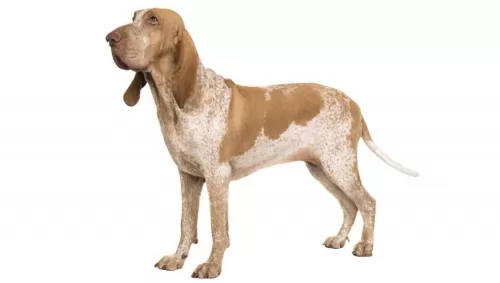 The attractive and popular breed in Italy, the Bracco Italiano was used for tracking and retrieving, evolving in Piedmont and Lombardy. It is believed the Bracco Italiano came about from crossing the Segugio with the ancient Asiatic Mastiff.
The attractive and popular breed in Italy, the Bracco Italiano was used for tracking and retrieving, evolving in Piedmont and Lombardy. It is believed the Bracco Italiano came about from crossing the Segugio with the ancient Asiatic Mastiff.
There are people however, who believe that the breed goes back to the St Hubert Hound, but it is certain that both hounds and gundogs are part of the breed’s ancestry. The dog only arrived in Britain in the last decade of the 20th century.
 Coming from the mountains and guarding their flock against cheetahs has led the Anatolian Shepherd to be a muscular dog with broad heads and thick necks and sturdy, strong bodies. Their ears drop and are triangular in shape, while their muzzles are rectangular with tight lips. Their double coat is thick and warm fitting for life in the mountain regions. They do blow their coats with excessive shedding twice a year. The fur on their throat is extra thick for their protection.
Coming from the mountains and guarding their flock against cheetahs has led the Anatolian Shepherd to be a muscular dog with broad heads and thick necks and sturdy, strong bodies. Their ears drop and are triangular in shape, while their muzzles are rectangular with tight lips. Their double coat is thick and warm fitting for life in the mountain regions. They do blow their coats with excessive shedding twice a year. The fur on their throat is extra thick for their protection.
Muscular, thin, their rib cage is large while their stomach is small. Their tails can be intact or docked. The Anatolian Shepherd is much like the Kuvasz or the Great Pyrenees in their size, shape and responsibilities. He is more agile and slenderer than those two dogs. Their bite is scissors or level, while their eyes are almonds, set apart in their heads.
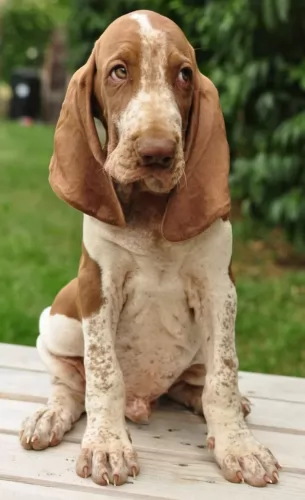 The Bracco Italiano is a large athletic, muscular dog. He stands at 58–67cm, weighing anything between 25 – 40kg. He reminds one somewhat of a German Short-haired Pointer. He has long ears and a serious expression, and this reminds one of a Bloodhound. He has short, shiny hair with his coat being white and chestnut or orange. The tail of the Bracco Italiano has always been docked, giving him an attractive, distinctive look but with rules and regulations coming in regarding docking, the long tail is often left intact. His eyes are brown.
The Bracco Italiano is a large athletic, muscular dog. He stands at 58–67cm, weighing anything between 25 – 40kg. He reminds one somewhat of a German Short-haired Pointer. He has long ears and a serious expression, and this reminds one of a Bloodhound. He has short, shiny hair with his coat being white and chestnut or orange. The tail of the Bracco Italiano has always been docked, giving him an attractive, distinctive look but with rules and regulations coming in regarding docking, the long tail is often left intact. His eyes are brown.
Braccos are wonderful pets – they are intelligent, loving, gentle and amicable, getting on well with children in the home as well as with other pets. Socialize and train them and they become gentle and obedient. They long to be involved with their human family and will adapt to life in the city or the country so long as they are made to feel like family. He is alert and makes a good watchdog. As with most other dogs, they can’t be bought, loved as a puppy and then ignored and left to themselves when they grow into adults.
 This breed is independent, stubborn and strong. They are great protectors of their flocks and people, but they are incredibly challenging to own. They are intelligent, loyal dogs who learn quickly when they want to. They key being “when they want to”. The Anatolian Shepard was bred to be nomadic, following the herd and hunting for the herd’s predators. Microchip your ASD because they will roam if they get the chance.
This breed is independent, stubborn and strong. They are great protectors of their flocks and people, but they are incredibly challenging to own. They are intelligent, loyal dogs who learn quickly when they want to. They key being “when they want to”. The Anatolian Shepard was bred to be nomadic, following the herd and hunting for the herd’s predators. Microchip your ASD because they will roam if they get the chance.
If you want your Anatolian to get along with other dogs, cats or other animals, socialize them together when the ASD is a puppy. If the animal or child is part of his flock the ASD will protect them with his life. Though he is loving, quiet and calm, the Anatolian is just as demanding and dominating. Never let your Anatolian Shepherd believe that he is above the humans in the pack or you will have a major problem controlling him. He will be especially leery of strangers and will not accept your word that the stranger is part of the family. However, if she understands that humans are above her and you are the leader, she will accept any person you accept.
Even if they accept strangers, they will not allow anyone other than the family into the home when the owner is not there. This is a proud, proud dog that can be stubborn, demanding and bossy. Being such a large dog, you need to be in control. This is not a dog for everyone. Be firm, confident, be loving and consistent when training an Anatolian Shepherd. Do not offer your ASD any additional training in protection. He doesn’t need it and it could be detrimental. They will protect children, but they do not respect them. Therefore, supervise their interactions with children.
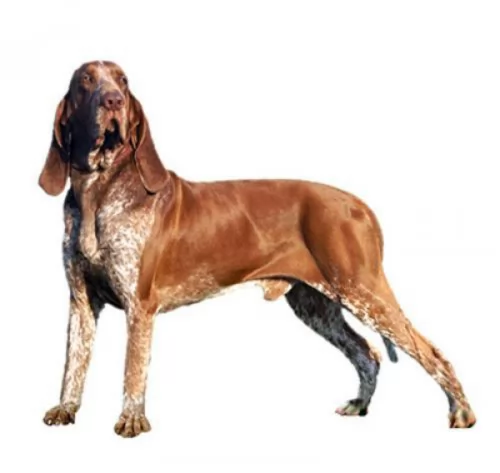 The gentle, amicable Bracco Italiano is a versatile dog that can be a super sport companion for active people and it can also be an exceptional companion for families and older people. He has a sweet, gentle expression and his amicable nature makes him easy to love. He is alert though, and therefore can be both protector and friend at the same time.
The gentle, amicable Bracco Italiano is a versatile dog that can be a super sport companion for active people and it can also be an exceptional companion for families and older people. He has a sweet, gentle expression and his amicable nature makes him easy to love. He is alert though, and therefore can be both protector and friend at the same time.
Overall, this easy going dog with his low maintenance coat can make an excellent 4-legged addition to any family.
 This is a healthy breed without a lot of the issues that plaque other giant breeds. In one recent survey the leading cause of death among the ASD is cancer and old age. Skin issues are more prevalent than dysplasia though it does occur. They have a sensitivity to anesthesia and their immune system does take longer to mature so all young ASD should be discussed with vets before any vaccinations are given. Bloat is not as common among this breed either. They should be screened for eyelid inversion or entropion. They are susceptible to Demodectic Mange or demodicosis which is caused by a mite.
This is a healthy breed without a lot of the issues that plaque other giant breeds. In one recent survey the leading cause of death among the ASD is cancer and old age. Skin issues are more prevalent than dysplasia though it does occur. They have a sensitivity to anesthesia and their immune system does take longer to mature so all young ASD should be discussed with vets before any vaccinations are given. Bloat is not as common among this breed either. They should be screened for eyelid inversion or entropion. They are susceptible to Demodectic Mange or demodicosis which is caused by a mite.
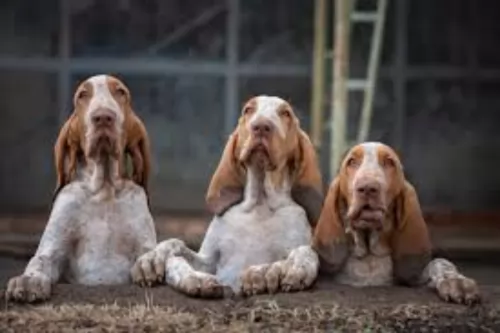 There don’t appear to be any major health issues with your Bracco Italiano and he can live to be 12, 13 or 14 years of age. Because he is a large breed however, you will need to watch out for hip dysplasia.
There don’t appear to be any major health issues with your Bracco Italiano and he can live to be 12, 13 or 14 years of age. Because he is a large breed however, you will need to watch out for hip dysplasia.
Hip dysplasia is a common skeletal disease with dogs and larger dogs have the genetic predisposition for hip dysplasia. Your dog can develop joint inflammation with pain and lameness.
Other health problems to look out for include kidney disease (Amaloidosis), cherry eye which results in dry eye. If you want to buy a Bracco Italiano, you should ask the breeder about the medical history of the parents.
 Feed your Anatolian Shepherd a measured amount twice a day and keep him from becoming overweight. It is recommended that you feed her from 4-6 cups of dry, high quality food for the entire day. The more active your dog is, the more she will need to eat. Using treats in training is appropriate but don’t give her too many as these will add to the waist line.
Feed your Anatolian Shepherd a measured amount twice a day and keep him from becoming overweight. It is recommended that you feed her from 4-6 cups of dry, high quality food for the entire day. The more active your dog is, the more she will need to eat. Using treats in training is appropriate but don’t give her too many as these will add to the waist line.
As mentioned previously this is a very healthy breed especially when compared with other giant and/or mountain dog breeds. However, they are susceptible but not prone to:
Should be tested for this condition in which the bones don’t fit well into the joint. Elbow Dysplasia – the same as above except it is the arm bone does not fit well into the joint. Both these conditions can cause arthritis or lameness.
Caused by mites and a weakened immune system it can result in patches of scaly, red skin and hair loss. A generalized version can cover the entire body and can be fatal.
This can result if obesity, hair loss, epilepsy, lethargy and other skin condition. It is easily treatable.
Mentioned previously it causes the eyelid to roll inward and requires surgery.
Your Anatolian Shepherd does not need a lot of exercise despite his size. A large yard with a good fence will do for him as long as he gets a walk daily. If they can run free in a large yard they will be happy. If not, you will need to take them to a dog park, preferable when other dogs are NOT present. You can’t assume he will be ok with other dogs. Never walk them off leash as they love to wander. They need a job to do.
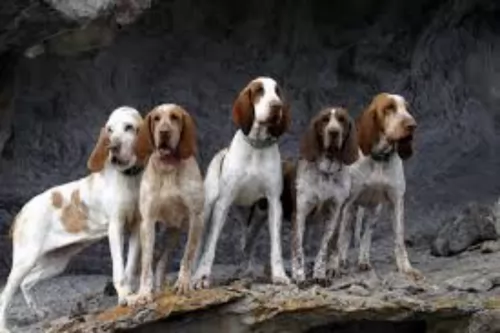 These dogs are moderate shedders so he will simply need a good brushing twice a week to ensure the coat is kept shiny and free from loose hairs. Nails should be clipped from time to time and he will also need to have his long ears checked for cleanliness. Long-eared dog breeds are more susceptible to canine ear infections.
These dogs are moderate shedders so he will simply need a good brushing twice a week to ensure the coat is kept shiny and free from loose hairs. Nails should be clipped from time to time and he will also need to have his long ears checked for cleanliness. Long-eared dog breeds are more susceptible to canine ear infections.
The Bracco is a large dog and therefore he will require a high quality, large-breed dog food formula. Your veterinarian can even recommend a quality commercially manufactured food for large, energetic dogs and which comes with all the vitamins and minerals required for such a breed.
Your vet will recommend you steer clear of foods with cheap fillers, lots of preservatives, sugar and colorants. He has a glossy, dense short coat and you want to ensure he gets raw meat, rice and vegetables from time to time to ensure that the beautiful coat never becomes dull and dry.
Cool, fresh water must always be available to him. Diet and nutrition is an important decision for your pet as it will ultimately affect his long term health.